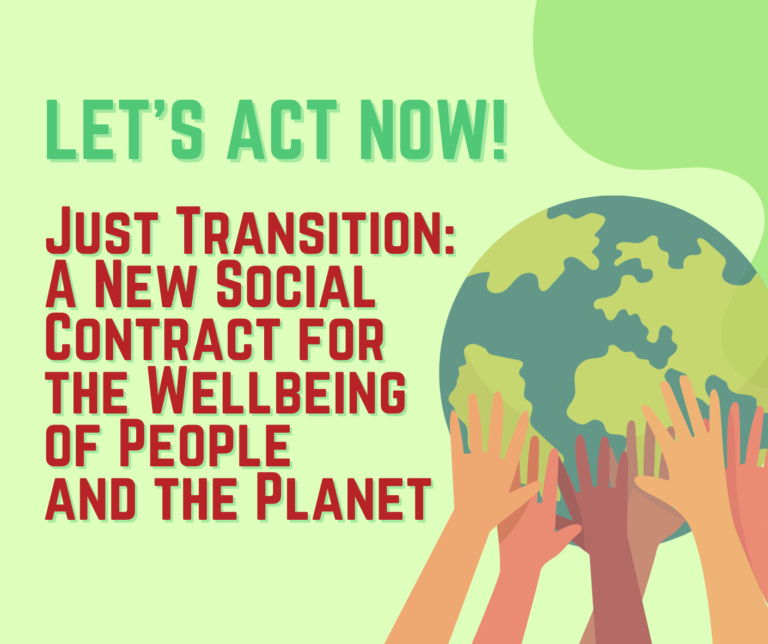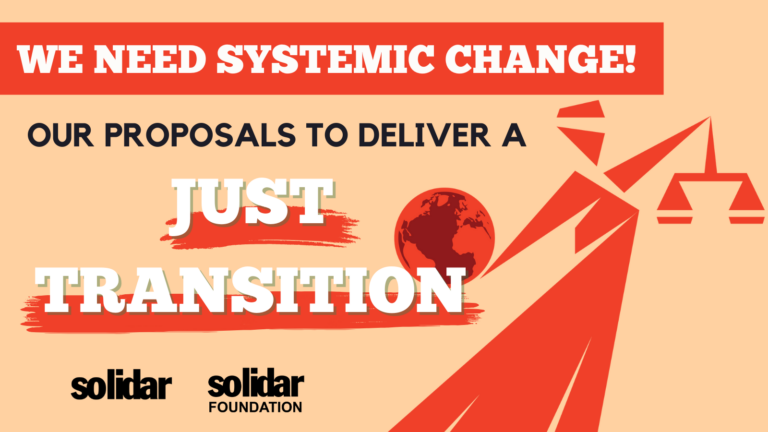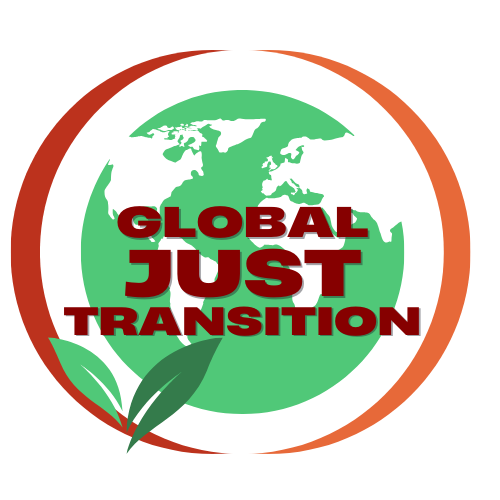a Just Transition in France and the role of grassroots movements
May 10, 2022
SOLIDAR and its members La Ligue de l’Enseignement and Ceméa celebrated Europe Day with a roundtable discussion on a Just Transition in France and the EU, and on the role played by grassroots movements in connecting social justice with climate action.
The roundtable, which gathered over 30 participants and was held in French, had the main objective of kick-starting a conversation on a socially Just Transition to climate neutrality among a diverse group of stakeholders in France, including member organisations of SOLIDAR and climate and environmental actors.
The meeting began with a presentation by SOLIDAR on the interconnections between social justice and climate change. The wealthiest 1% of the world’s population are responsible for twice as much carbon emissions as the poorer half of the world[1], and the most vulnerable people and systems are disproportionately affected by climate change and environmental degradation. In addition, climate and environmental policies have strong social impacts, especially on the poorest, if their social dimension is not sufficiently taken into account. We need Just Transition investment, strategies and policies that address socioeconomic inequalities and deeply transform our societies to make them more equal, fair and sustainable. The European Green Deal, the EU’s strategy to make Europe climate-neutral by 2050, fails to provide a comprehensive pathway for a Just Transition, but contains some relevant “social justice” elements and initiatives, which make the political debate on Just Transition at EU level more advanced than in some of the Member States.
Céleste Duriez, Climate & Jobs Manager at Réseau Action Climat (RAC France), concurred that the green transition should further social cohesion, instead of creating more inequalities, and that a “Just Transition” means more than simply providing economic compensation to those affected by it – it’s about creating transformational change. According to Céleste, France still lacks precise Just Transition frameworks and roadmaps, and only some mitigation policies have been developed during the past few years. “To advance a Just Transition in France”, said Céleste, “we need to encourage exchanges like the one we are having today. It is necessary for all of us to discuss these issues altogether and ask for actions that ensure a Just Transition”. In conclusion, she stressed that climate and environmental organisations in France, which first approached the issue of a Just Transition as a consequence of the yellow vests protests, have now widened their approach to the green transition and are also working on broader social issues.
Eric Favey, Vice-President in charge of Ecological Emergency and Transition at Ligue de l’enseignement, underlined the importance of strengthening social acceptance of the green transition. Civil society organisations have an important role to play in advocating for transformative policies and in preparing society to accept difficult yet necessary changes, while ensuring that the costs do not fall on those in vulnerable situations. To do so, our organisations need to build a convincing narrative, more accurately portrait the ecological transition not as a need in itself, but as a means to move towards the world of tomorrow, and provide well-thought out solutions. This requires working on civic education and reinforcing the work of La Ligue, Ceméa and partner organisations in this area. Eric concluded by saying that our behaviours are at the origin of the problem, so only by changing them, we will be able to change things. “I believe that we have a challenge to take on, but it’s also an opportunity for all organisations to build new links and partnerships with other organisations and put our heads together to bring a new economy and foster social and democratic acceptance“, stressed Eric.
Stéphane Bertrand, Manager for the Ecological Transition at the Centres d’Entraînement aux Méthodes d’Education Active (Ceméa), provided a brief overview of how Ceméa seeks to integrate the imperatives of the ecological transition into their action for social justice: by taking into account the needs of the individual; through activities that invite to adopting a different relationship to consumption; with environmental education and, lastly, the establishment of spaces for democracy. Then, Stéphane mentioned 3 projects by Ceméa that include an ecological dimension: the digital project Zourit, which consists in developing digital platforms promoting the collective organization of associations; the adventure playgrounds, thanks to which children and families in disadvantaged areas play in public spaces and build huts with recycled materials; and the way in which many activists in Ceméa question the ecological impact of their travels and re-think exchange activities between countries.





